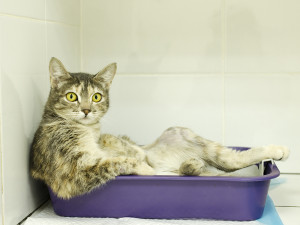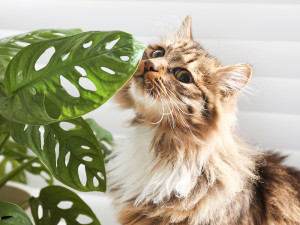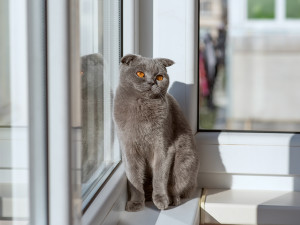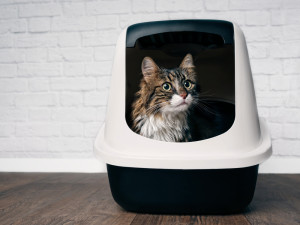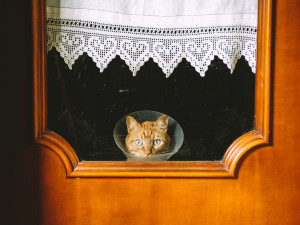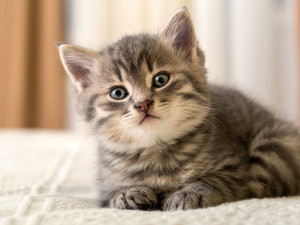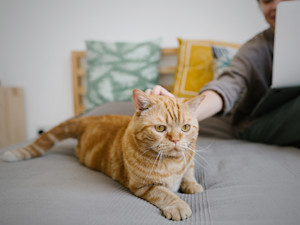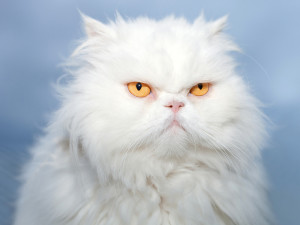Why Does My Cat Have Diarrhea?
Let’s try to, erm, firm up the details.
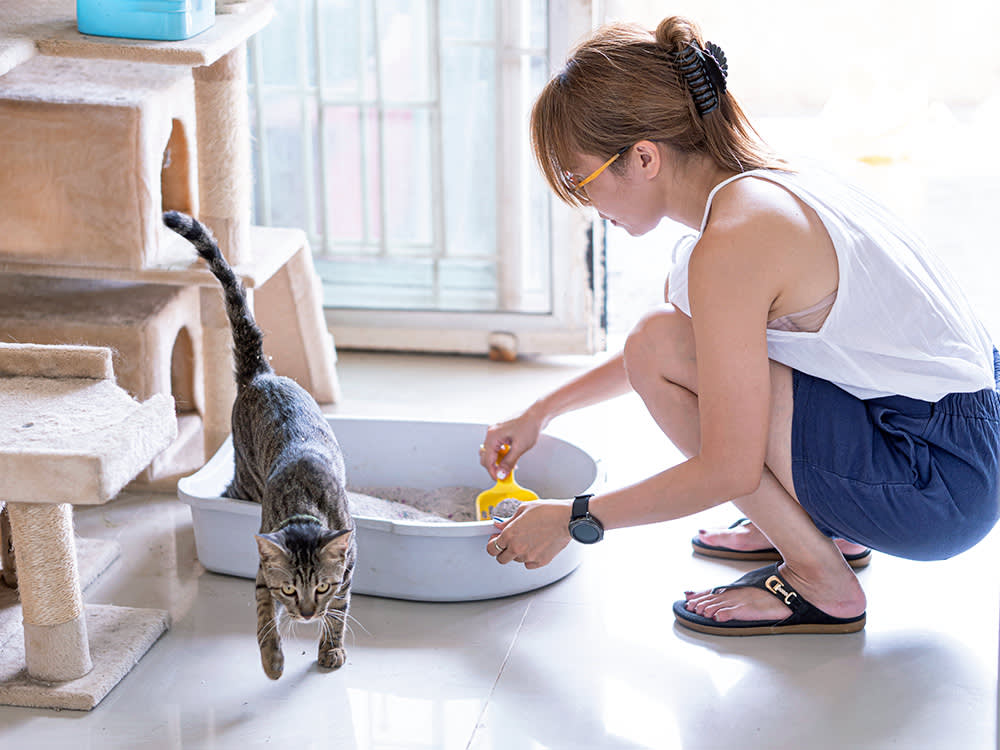
share article
In This Article:
Potential Causes of Acute Cat Diarrheaopens in a new tab Potential Causes of Chronic Cat Diarrheaopens in a new tab When to Seek Veterinary Care opens in a new tab Cat Diarrhea Treatment Optionsopens in a new tab Home Remedies for Cat Diarrheaopens in a new tab
Diarrhea is a common health issue in catsopens in a new tab, characterized by loose, watery stools and has an array of potential causes. While occasional diarrhea in an otherwise healthy cat may be triggered by diet or stress, chronic or severe diarrhea can indicate a more serious underlying problem that should be worked up and treated by a veterinarian. Evaluating the source of diarrhea can be complex and elusive.
Veterinarians will use various factors, such as age, severity of signs, duration, other health factors, and general history to diagnose feline diarrhea. Characterization of diarrhea as acute versus chronic is one of the first steps used to narrow down the underlying cause - these categories are explored below. This designation is not synonymous with severity or risk to wellbeing. There are key points to consider for when to seek veterinary attention.
Potential causes of acute cat diarrhea
Diarrhea that has a sudden onset, short duration, or is self limiting can be classified as “acute.“ This designation can help your veterinarian narrow down why your cat may be experiencing diarrhea. These are often from external exposures like food or pathogens.
Dietary indiscretion
Diarrhea may result from simply changing your cat’s diet or introducing new treats, with some individuals being more sensitive to diet changes than others. However, if a cat raids the trashopens in a new tab or consumes a known gastrointestinal irritant, like certain plantsopens in a new tab or toxins, diarrhea may result.
Medications
Antibiotics and many other medications prescribed by your veterinarian can cause diarrhea.
Stress or anxiety
As with people, a stressful event can trigger the flight-or-fight response which is a hormonal cascade that prepares the body physiologically for a perceived threat. One of the unpleasant side effects is increased activity of the colon, or a sudden bout of diarrhea, sometimes called “ stress colitisopens in a new tab.” Although more common in dogs, kitties are not immune to this response, one of the most common presentations being a very unhappy situation in the carrier on the way to the vet.
Physical stressors, such as extreme exercise, temperature, or pain can also cause “stress colitis.” Diarrhea secondary to stressful stimuli may be more likely if there is an underlying disease process affecting the intestinal tract.
Intestinal parasites
Cats without a good deworming history as kittens, indoor/outdoor cats, and cats who live with other animals that go outside are at risk for intestinal parasites which can cause diarrhea. Various wormsopens in a new tab and protozoans, like Giardia and Coccidia, can cause opens in a new tabdiarrhea symptoms in cats and kittens. Although if untreated, this type of diarrhea can be chronic, acute exposure can result in new, sudden onset diarrhea symptoms. Some of these parasites can be transmitted to humans so can also pose a risk to a pet’s family’s health.
Viral infections
One of the most dangerous viruses our cats can be exposed to is panleukopenia virusopens in a new tab, which can cause severe, life threatening diarrhea and vomiting. Luckily there is an effective vaccineopens in a new tab for this virus.
However, unvaccinated or under-vaccinated cats and kittens are at risk. Even if indoor only, unvaccinated cats are at risk, as we can track the virus inside via our shoes, or our dogs can bring it into the home on their feet. It is generally spread through a fecal oral route. If you have a kitten or undervaccinated cat, this would be higher on the list of possibilities for a cat with diarrhea although vomiting and other signs tend to accompany this serious disease.
There are other common viruses that can cause diarrhea in cats, such as the feline corona virus that can be common in shelters and cats exposed to new animals.
Bacterial infections
Like people, cats are susceptible to diarrhea after exposure to pathogenic bacteria, such as through food contamination. Although cats appear to be more resistant to diarrhea from E.coli, Listeria, and Salmonella, these and other bacteria can still make them sick. Recalled pet food due to contaminationopens in a new tab could make your cat sick but a more likely source is from raw food diets.
Raw food diets have notoriously high bacterial burdens so are strongly discouraged for your cat’s safety. This high bacterial burden can also be a source of zoonotic (animal to people) infection, meaning that on a raw diet your cat may acquire dangerous bacteria, which can be shed in the feces, posing a risk to people in the home, especially children or immunocompromised individuals. Higher bacterial load in raw food also means greater risk of exposure microbes that are antibiotic resistant, presenting a general public health hazzardopens in a new tab.
Potential causes of chronic cat diarrhea
Diarrhea in cats that lasts longer than a few weeks is considered chronic. While some above acute causes can become long-term issues without intervention, illnesses in cats that produce chronic usually indicate a systemic issue and often accompany other major symptoms such as vomiting and weight loss. The following represent some sources of chronic diarrhea in cats.
Food sensitivities
In cats and dogs, reactions to food are often gastrointestinal, dermatological, or both. Both food allergy (immune-system mediated) and sensitivity (not immune-mediated) are poorly understood in our pets, but it appears that some cats develop gastrointestinal signs, like chronic diarrhea, when exposed to certain common sources of proteins found in pet foods. These food-reactive cats seem to have their diarrhea resolve after elimination diet trials using select proteinsopens in a new tab.
Inflammatory bowel disease
Inflammatory bowel disease (IBD) is unfortunately a common disease opens in a new tabin middle-aged to older cats and can involve the entire or selective parts of the gastrointestinal tract. Chronic diarrhea, vomiting, and/or weight loss are some of the hallmarks of this poorly understood disease. Definitive diagnosis involves biopsies through endoscope or surgery but often is presumed when other causes of diarrhea are ruled out. It can range from mild to debilitating and can have complex progression and treatment.
Gastrointestinal lymphoma
GI lymphoma is cancer of the stomach opens in a new taband/or intestine due to infiltration of large or small type immune cells, the latter being very similar to IBD. Symptoms, treatment, and even prognosis can be similar for both conditions. This type of intestinal cancer is not rare in cats but can have a variable progression depending on cell type, organs affected, and individual health of the patient.
Other systemic issues
Chronic diarrhea can accompany other notable conditions, such as hyperthyroidism, exocrine pancreatic insufficiency, diabetes, and other types of cancers. Overall, diarrhea is not specific to any particular disease, so ultimately a veterinarian should be involved in your pet’s care if they have chronic diarrhea.
When to seek veterinary care
Diarrhea is very distressing to witness in our pet cats and should be cause for concern. Understandably, it is not always obvious when cat parents should consult their veterinarian. The following are general guidelines for when you should be more worried and seek out the advice of your cat’s doctor:
Presence of vomiting or change in appetite.
If your cat is lethargic, hiding, or having other altered behavior.
If the diarrhea lasts longer than 48 to 72 hours, even if your cat has normal energy, appetite, and no vomiting.
Presence of blood or black feces.
In kittens, seniors, or other medically compromised kitties, diarrhea can become an emergency quickly due to more rapid dehydration from fluid loss, regardless of the underlying cause. It’s best to consult your vet at the first sign of seeing loose stool in young or old cats.
Cat diarrhea treatment options
Treatment of diarrhea in cats depends on the underlying cause. For mild cases where your vet does not suspect major underlying pathogens or disease, they may recommend an easily digestible, bland diet for a few days and probiotic supplementation. Prophylactic deworming is common but if your cat tests positive for a specific parasite, the deworming may be more targeted. Historically, an antibiotic called metronidazole was the go-to for many veterinarians at the first sign of diarrhea.
Although an excellent treatment for confirmed Giardia or certain specific bacterial infections, like all antibiotics, it can cause gut microbiome dysbiosis, or reduction in the richness and diversity of healthy microbes vital to a normal gut. Research in people and animalsopens in a new tab indicates that overprescribing antibiotics can create lasting problems for the normal gut environment, making diarrhea worse long term. Metronidazole has a foul tasteopens in a new tab, making administration to cats very difficult and can itself cause anorexia after administration given its offensive flavor.
Chronic diseases, like dietary intolerance and IBD, require long-term treatment, as these can never be “cured.” Various prescription diets or nutritionist-vetted home-cooked diets may be required for food sensitive cats. IBD usually requires immunosuppression with steroids or immuno-modulatory drugs, like cyclosporine. A multimodal approach for IBD using a combination of diet, probiotics, and immunosuppression can sometimes have the best response. The treatment for intestinal lymphoma and severe IBD may also include chemotherapy.
Home remedies for cat diarrhea
There are things cat parents can do to help prevent diarrhea. General health and wellness with good nutrition, a low stress, enriched environment, and regular vet visits for parasite prevention and vaccination are good places to start. Keeping cats indoors and being cautious when introducing new animals to the family (especially if the new animal goes outside) can also be helpful.
If diarrhea at home occurs, pet parents want to know what they should do first. If your pet is acting completely normally, eating normally, and not vomiting, you can try a bland diet such as boiled chicken and white rice, plenty of fresh water, and close monitoring of symptoms. However, if there are any changes in your cat's behavior, appetite, or vomiting occurs, the safest thing is to seek veterinary attention. Over the counter medications such as Pepto Bismol or Imodium are toxic to cats and should never be administered.
FAQs (People also ask):
What can I give my cat for diarrhea?
There are not a lot of good over the alternative options for diarrhea in cats. If your cat is otherwise well, a bland diet and a veterinary probiotic to support gut health opens in a new tabare options to try. However, if your pet is showing other systemic signs like vomiting or not eating, it is best to consult a veterinarian. Do not give your cat Pepto Bismol, Imodium, or other human diarrhea medications.
What should you feed a cat with diarrhea?
If a cat is having diarrhea but has a normal appetite, you can try a bland diet of boiled chicken and white rice or a commercially available, “easily digestible” diet. Cats can be picky eaters and may be resistant to a new food, especially if their GI tract is dysregulated to begin with. Feeding their regular diet in this case would be appropriate but if they have a poor appetite you should consult your veterinarian.
What can cause diarrhea in cats?
Causes of diarrhea in cats are variable, from simple dietary indiscretion to lymphoma of the intestinal tract. The differential diagnoses will depend on a lot of particular factors related to your cat’s individual health and history. If your cat is having diarrhea, especially in combination with vomiting, change in appetite, and/or change in behavior, it is best to seek veterinary attention to discuss possible causes with your cat’s doctor.
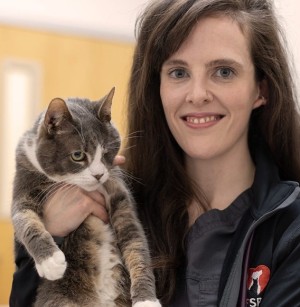
Melanie Glass
Melanie Glass is a veterinarian practicing in New York City, currently working in shelters and private practice. She is particularly passionate about feline medicine, dentistry, surgery, and animal welfare. When not working, she balances training for road races in Central Park, exploring with city with friends, and quality time reading at home with her cats, Christina Crawford, Rosalind Franklin, and Starfish.
Related articles
![Maine coon cat using the litter box.]() opens in a new tab
opens in a new tabUncovered Secrets: Why Cats Don’t Always Cover Their Poop
And how you can encourage them to cover up after doing their business.
![a cat peeks out of a litter box lid]() opens in a new tab
opens in a new tab5 Litter Boxes Your Cat Likely Won’t Reject
Think like a cat when choosing a litter box...so you can go back to not thinking about litter boxes.
![cat with cone after vet visit]() opens in a new tab
opens in a new tabDoctor’s Orders: Cat Vet Visits Are Essential
Get thy cat to a vet, even if it’s a struggle to get them out the door.
![Kitten sitting on a blanket]() opens in a new tab
opens in a new tab7 Steps to Keep Your New Kitten Happy and Healthy
With great cuteness comes great responsibility. A vet breaks down everything you need to know when you bring home a new kitten.
![Owner pets senior ginger cat.]() opens in a new tab
opens in a new tab6 Common Health Concerns in Senior Cats
How to spot and how to treat them.
![White Persian cat on a blue background]() opens in a new tab
opens in a new tabUTIs Suck for Your Cat, Too
Here’s how to help them get relief.
